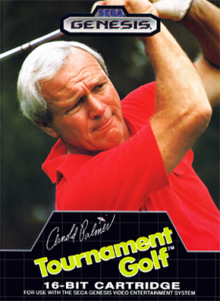
Jack William Nicklaus, nicknamed "the Golden Bear", is a retired American professional golfer and golf course designer. He is widely considered to be either the greatest or one of the greatest golfers of all time. He won 117 professional tournaments in his career. Over a quarter-century, he won a record 18 major championships, three more than second-placed Tiger Woods. Nicklaus focused on the major championships—the Masters Tournament, U.S. Open, Open Championship and PGA Championship—and played a selective schedule of regular PGA Tour events. He competed in 164 major tournaments, more than any other player, and finished with 73 PGA Tour victories, third behind Sam Snead (82) and Woods (82).

Mario Golf: Toadstool Tour, known in Japan as Mario Golf: Family Tour, is a 2003 sports game developed by Camelot Software Planning and published by Nintendo for the GameCube. It is the sequel to the 1999 Nintendo 64 title Mario Golf, and is the third game in the Mario Golf series. It was released in North America on July 28, 2003, in Japan on September 5, 2003, and in PAL regions in 2004.
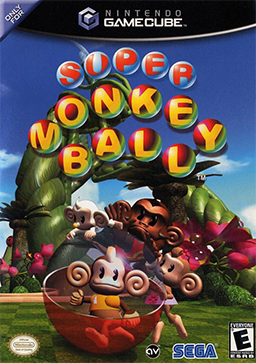
Super Monkey Ball is a 2001 platform party video game developed by Amusement Vision and published by Sega. The game debuted in Japan at the 2001 Amusement Operators Union trade show as Monkey Ball, an arcade cabinet running on Sega's NAOMI hardware and controlled with a distinctive banana-shaped analog stick. Due to the discontinuation of Sega's Dreamcast home console and the company's subsequent restructuring, an enhanced port dubbed Super Monkey Ball was released as a launch title for the GameCube in late 2001, garnering interest as Sega's first game published for a Nintendo home console.
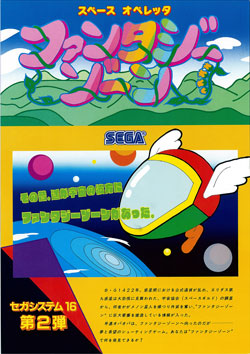
Fantasy Zone is a 1986 arcade video game by Sega, and the first game in the Fantasy Zone series. It was later ported to a wide variety of consoles, including the Master System. The player controls a sentient spaceship named Opa-Opa who fights an enemy invasion in the titular group of planets. The game contains a number of features atypical of the traditional scrolling shooter. The main character, Opa-Opa, is sometimes referred to as Sega's first mascot character.
The following is a glossary of the terminology currently used in the sport of golf. Where words in a sentence are also defined elsewhere in this article, they appear in italics. Old names for clubs can be found at Obsolete golf clubs.

Pete Sampras Tennis is a sports video game developed by Zeppelin Games and published by Codemasters for the Sega Genesis and Game Gear in 1994. It was followed by Sampras Tennis 96 for the Genesis and Pete Sampras Tennis '97.

PGA Tour Golf is a golf video game and the first in the PGA Tour game series. It was developed by Sterling Silver Software and released in 1990, for MS-DOS. It was initially published by Electronic Arts, which subsequently released versions of the game for Sega Genesis and Amiga in 1991, followed by a version for the SNES in 1992. By 1994, Tengen had published versions for Sega's Master System and Game Gear consoles. PGA Tour Golf received generally positive reviews for its realism, sound, and camera. Several critics considered the computer versions to be the best golf game available at the time of its release. It was followed by PGA Tour Golf II.

Super Monkey Ball Deluxe is a platform video game developed and published by Sega. It was released for the PlayStation 2 and Xbox in 2005. The game compiles all stages from Super Monkey Ball and Super Monkey Ball 2, as well as adding original levels.

Tiger Woods PGA Tour 07 is a sports video game developed by EA Redwood Shores for the Microsoft Windows, PlayStation 2, Xbox, Xbox 360, Wii and as a launch title for the PlayStation 3 version and Team Fusion for the PlayStation Portable version and published by EA Sports for Microsoft Windows, PlayStation 2, Xbox, PlayStation Portable, Xbox 360, PlayStation 3 and Wii.

Swingerz Golf is a sports video game released by Telenet Japan in 2002. It is a golf simulation game that allows the player to choose from 14 different characters, each with different strengths and weaknesses, to play on any of the game's 6 courses, varying greatly in difficulty and atmosphere. Along with normal match and stroke modes of play, the game offers a tour mode, which simulates the career of a chosen character, a mission mode, consisting of a series of challenges that gradually increase in difficulty, and minigames, including a sudden death style of gameplay and a near-pin style of gameplay.

Dream Match Tennis is a 2006 tennis simulation game developed by Bimboosoft, a company based in Saitama, Japan. Unlike other games in its genre, Dream Match Tennis was aimed to produce a more realistic depiction of the sport, requiring more skill from the player in order to direct their shots accurately.
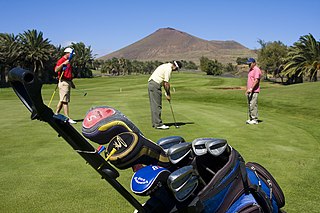
Golf equipment encompasses the various items that are used to play the sport of golf. Types of equipment include the golf ball, golf clubs, and devices that aid in the sport.

Variations of golf include methods of scoring, starting procedures, playing formats, golf games, and activities based on or similar to the sport of golf which involve golf-like skills or goals.

Golf is a club-and-ball sport in which players use various clubs to hit a ball into a series of holes on a course in as few strokes as possible.

Putt & Putter is a miniature golf video game released for the Master System in April 1992 and Game Gear in December 1991. It was developed by SIMS Co, and published by Sega. In Brazil the game was called Mini-Golf. The back of the box describes it as a cross between mini-golf and pinball.
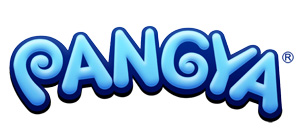
PangYa was an online multiplayer casual golf simulation game designed by Korean development company Ntreev Soft and NCSoft.

Major Title is a golf sports video game that was released by Irem to arcades in 1990. A version of the game for the Super Nintendo Entertainment System as well as an arcade sequel, Major Title 2: Tournament Leader, were released in 1992. The SNES game and the arcade sequel were released in the United States as The Irem Skins Game.

Chi Chi's Pro Challenge Golf is a 1993 golf video game that was released for the Sega Mega Drive featuring Chi-Chi Rodríguez.

Beach golf is a variation of golf mainly played on sandy beaches. It was devised with the aim of a simplified and more accessible version of golf.

GolfStar is a massively multiplayer online golf video game which features character development and MMORPG elements. It is developed by the South Korean game developer Com2Us. The English-language Microsoft Windows version is published by German game publisher gamigo AG. An alternate version for iOS and Android also exists, self-published by Com2Us. Although there is no subscription fee or cost to download and play the game, the game offers "Star" and "Star Premium" membership plans for a monthly fee. Additional in-game items may also be purchased with real currency.
